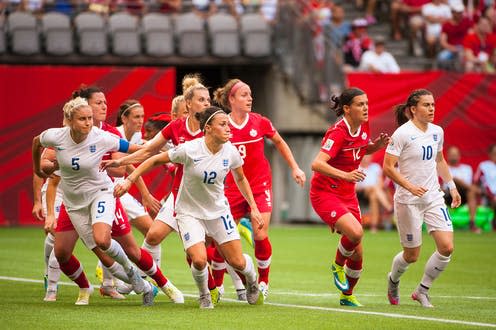Women in sport: misogyny among male fans is rife but progressive masculinities are on the rise

When the Football Association in England launched the Women’s Super League in 2011, it was the first milestone in what sport sociologists have identified as a new age for media coverage of women’s sport, and football in particular. The success of women athletes at the London 2012 Olympic Games, along with Sport England’s subsequent This Girl Can media campaign which ran nationwide, cemented this trend.
The 2015 FIFA Women’s World Cup is seen as a turning point. Print journalists paid a lot more attention than they had previously. And for the first time all of England’s matches were televised live, while viewership numbers across the world broke records.
In a new study, led by Durham University and in collaboration with the University of Leicester and the University of South Australia, we set out to examine men’s attitudes towards women’s football, and sport in general, in this new age of media attention in the UK. From September 2015 to January 2016, we surveyed 1,950 men football fans from across the country, recruited through football fan message boards.
Research has shown that in many countries across the world, football operates as one of the last bastions of male domination. Our findings show that among football fans, while men with openly misogynistic attitudes are still in the majority, media exposure to women’s sport can in fact change perceptions.
Progressive attitudes
Based on the answers 507 of the respondents gave to our open-ended questions, we identified three different types of masculinities: progressive, openly misogynistic and covertly misogynistic.
The first group, which accounted for 24% of our respondents, expressed more gender-equal attitudes. They thought the 2015 FIFA Women’s World Cup marked a positive turning point in terms of representation of women’s sport. One Liverpool fan (age 36-45) thought the tournament “raised the profile of the women’s game”.
Fans in this group frequently connected this increased exposure with a perceived genuine change in men’s attitudes and a subsequent rise in the popularity of women’s sport. They thought the media had an obligation to promote women’s football to inspire girls at grassroots level, beyond just “helping it become accepted by your typical scoffing, uniformed male,” as one Halifax Town fan (age 36-45) put it.
Our findings show that media coverage of women’s sport had also altered some men’s perceptions. “It changed my view on the sport,” said one Bury fan (age 26-35). “ I used to see it as a bit of a joke, but having watched the [Women’s] World Cup [I] now feel the opposite.” This showed that some men had moved from misogynistic attitudes to more progressive attitudes in response to changes in media coverage.
Overtly misogynistic
The most dominant group, however, at 68% of respondents, was overtly misogynistic. Previously, research has suggested that younger men would express more positive attitudes than older men. However, based on our open-ended questions, our findings show no such generational differences.
Instead, men from across this group thought women have no place in sport. “They are useless at it,” said one Leeds United fan (age 46-55). They variously described women’s football as “not as dynamic, quick, skilful”, “slower and weaker” and “less competitive” than men’s football. Pegging women as neither as strong or as powerful as men, they expressed beliefs grounded in what gender studies specialists call essentialist reasoning: they maintained assumptions of men’s physical superiority.
They were extremely hostile towards the increasing media coverage women’s sport was getting, repeatedly labelling it as “positive discrimination” or “PC nonsense”. These reactionary views align with what feminist author and journalist Susan Faludi has described as the anti-feminist backlash. They perceive women’s sport as a threat to what they see as a traditionally male preserve. One West Ham fan (age 26–35) put it brashly:
It now means there is too much women’s sport on the TV; no one really cares [about it]. Women’s football in the media all the time, women’s golf on Sky and the men’s Euro tour on the red button. NETBALL ON SKY!!! The one thing that does irk me is Women’s Hour on Sky Sports News. No woman watches Sky Sports News! NO WOMAN! I honestly wish they’d just piss off out the spotlight. But it’s all PC bollocks nowadays.
Covert misogyny
This group – the smallest of the three, at 8% of respondents – saw men skilfully manoeuvre between progressive and hostile attitudes. These men could discuss women’s involvement in sport in positive ways, appearing to be behind gender equality agendas. However, they still thought women’s sport inferior.
Men in this group drew on notions of essentialism and biological differences between men and women to explain what they saw as natural inequalities between men’s and women’s sports. But, like this Carlisle United fan (age 26-35), they also wanted the women to be successful:
I have no interest in watching what I believe to be a lower standard of sport. But then I don’t watch Notts County v Dagenham & Redbridge [lower league men’s teams] if it’s on, either. I wish the girls well. I hope they win every time they play, as I do anyone representing England, but I won’t be watching.
Organisations continue to face pressure to address gender inequalities. Our model of masculinities may be helpful as a tool for studying other settings – the workplace, education, the creative industries – in a bid to tackle broader societal misogyny.
What did you think of this article?
Great | Good | Meh | Weak
This article is republished from The Conversation under a Creative Commons license. Read the original article.

Stacey Pope receives funding from the Arts and Humanities Research Council (grant number AH/N004841/1). This article is based on research done in collaboration with John Williams, the University of Leicester and Jamie Cleland, University of South Australia.

 Yahoo Sport
Yahoo Sport 





































